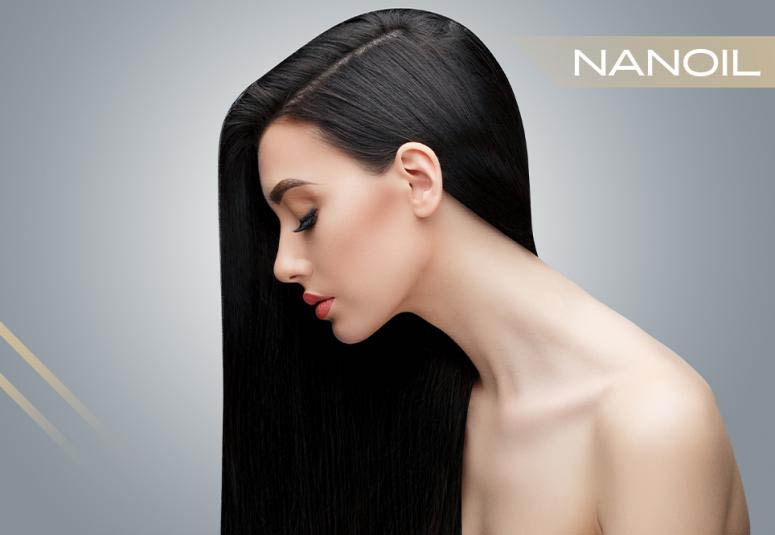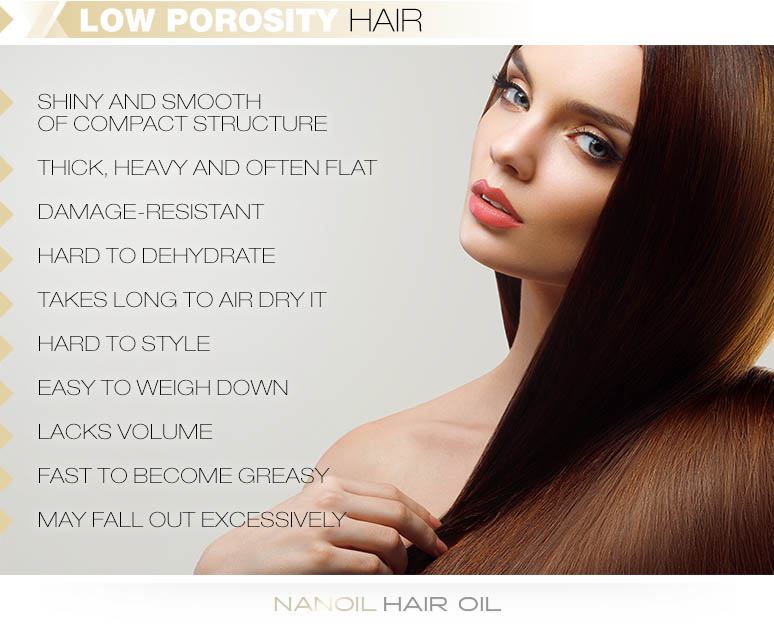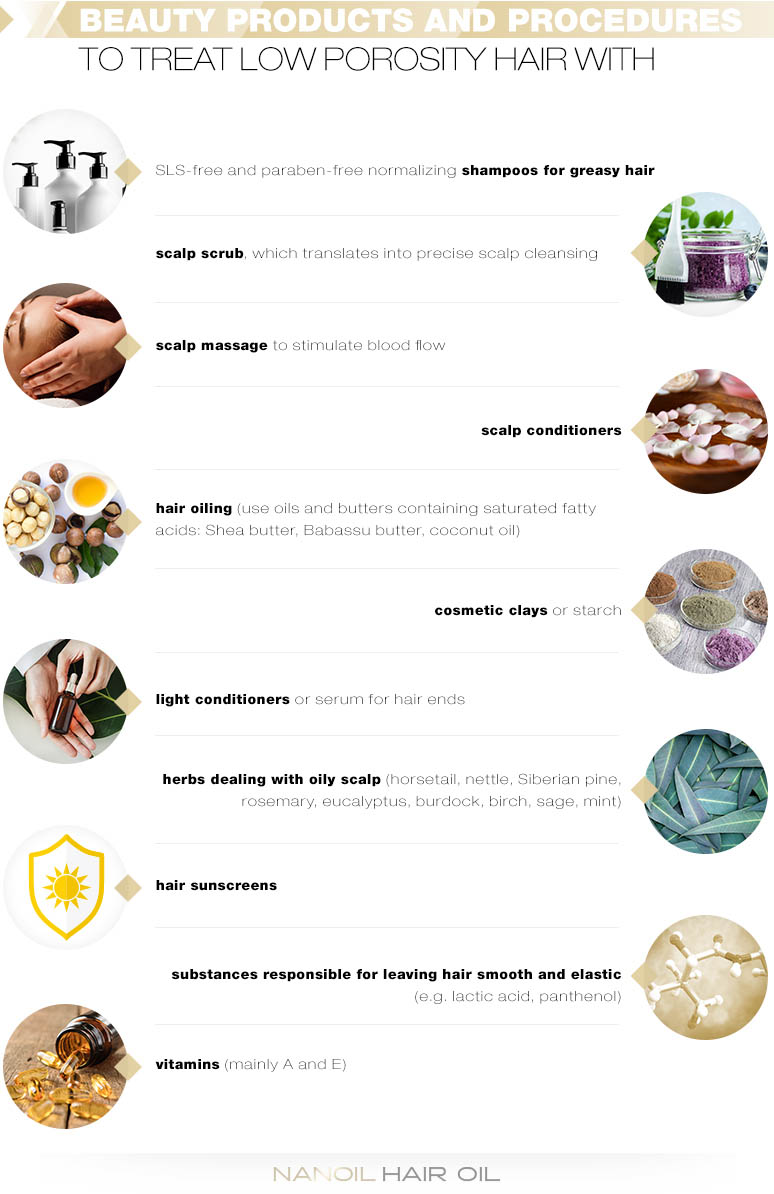- NANOIL Products
- Oils
- Face serums
- Hair masks
- Shampoos
- Hair conditioners
- Hair styling
- Care
- Hair Porosity Test
- Blog
- Contact

Here's a myth to shatter: tightly overlapping hair cuticles aren't always a sign of healthy hair. Untrue is also the conviction that low porosity hair doesn't require receiving proper care that satisfies its needs. Obviously, each hair porosity type has its 'demons' which are characteristic features that make a particular hair type different from the other. Additionally, it must be realized once and for all that ill-matching care worsens condition of hair no matter of its type. How can you recognize that your hair is low porous? How to take care of low porosity hair properly? Owing to this article you are going to learn everything that you should know about low porosity hair.
Your hair structure is compact because its cuticles overlap each other very tightly and embrace the hair shaft closely. Improper care or a complete lack of it may disturb this hydro-lipid balance in a snap and weaken the hair considerably. Another characteristic feature of low porosity hair is its resistance to styling, which translates into its high unmanageability. It's hard to take the right care of such strands because all the nourishing substances that you try to supply your strands with by applying cosmetics aren’t potent enough to penetrate so compact hair structures. Instead they build up on the hair's surface. This results in overburdened hair and excessive sebum production.
Furthermore, low porosity hair happens to be heavy and flat because most hair care products combined with the excess of sebum (greasy hair) weigh the stands down. Moreover, this type of hair is often affected by dandruff. Scalp is frequently treated with strong and aggressively cleansing agents which intensifies seborrhea, whereas hair ends - treated with the same shampoo - start getting more and more dehydrated. Just like any other type, low porosity hair needs protection from the damaging action of the external aggressors as well as from excessive water loss that evaporates from the inner hair structures.
Due to being thick, strong and rather stiff, it's hard to style low porosity hair. In short, it tends to return to its natural looks pretty fast. Furthermore, it takes long for low porosity hair to air dry after washing. It’s caused by the hair’s ability to absorb more water that later remains hidden behind the closed cuticle layer which, as mentioned above, is typical for this hair porosity type. However, it doesn't mean that the hair can't become dehydrated - and this problem especially applies the hair ends. Low porosity hair often lacks volume as it's easy to overburden it. Also, the excess of sebum makes it greasy the next day (or even the same day) since washing. Last but not least, this hair type is affected by dandruff more often than other hair types.

Luckily, hair that is low porous has its good sides, too. Undoubtedly, it's surprisingly damage-resistant so various hairdressing procedures don't ruin it as fast as it's with other hair types. What’s more, low porosity hair is healthy, strong, smooth, thick and shiny by its nature. Such strands don't require being exposed to intensive care like high porosity hair, for example. In this case, the amount of hair care products applied doesn't translate into the quality of hair. In light of this, let's analyze how and what should be used to take care of low porosity hair.
A shampoo used to wash low porosity hair should mostly deal with the excess of sebum and impurities that are fast to gather on this type of hair. Remember though that despite being strong and resistant, it's a bad idea to reach for intensively cleansing shampoo containing SLS and parabens to wash low porosity hair. After all, such product irritates and triggers allergic reactions in scalp and leaves it dehydrated which consequently leads to the problem of excessive sebum production.
To wash low porosity hair reach for a shampoo that is composed of natural substances which simultaneously helps to regulate oily glands' work and leaves hair both stronger and lifted at the roots. Moreover, such product shouldn't be composed of cleansing agents only but also of the moisturising ones. Therefore, look for shampoos featuring the following ingredients: panthenol, lactic acid or hyaluronic acid. A matching shampoo gifts unmanageable hair with elasticity, smoothness and softness.
Indeed, nourishing low porosity hair is a challenge. Most of drugstore balms tend to overburden this type of hair. Actually, when it comes to low porosity hair care, you can resign from applying conditioners and masks to, instead, focus on hair oiling combined with herbal care. It must be realized that low porosity hair doesn't like being exposed to too a high dose of proteins - it makes the hair matte and stiff which impedes further styling. Also, such hair doesn't tolerate excess of emollients, especially those which may residue on hair's surface and overburden it (note: emollients are added to hair conditioners with oils that are destined for medium and high porosity hair). Lanolin and glycerin aren't recommended to treat low porosity hair either.
Low porosity hair likes minimalist solutions but it also needs a moisture boost and detox, therefore, you should make use of the powerful Nanoil Masks. Once a week, clear the tresses of product buildup and sebum using activated charcoal and white clay mask or hydrate them with the intensively-moisturizing marine algae mask.
Low porosity hair will get along with oils and butters that belong to so-called non-drying group, which means that their molecules are relatively tiny and made from saturated fatty acids. Big molecules aren't able to penetrate this closely overlapping shield of cuticles of low porosity hair, therefore they can't do nothing more than just overburden the hair. Light oils won't only balance sebum production and leave scalp clean but also make the strands lighter so they are lifted at the roots easily. Result? Luster and light hair, clean scalp without a trace of dandruff or seborrhea. A perfect tool to work with Nanoil - created with well-selected components (including a few small-molecule oils) that provide hair with the proper care and stunning looks.
Apart from well-matching oils, which in this case should be perceived as one of the main substances used to take care of hair, it's worth reaching for scalp scrubs, herbal distillates and scalp conditioners. Such products contain an array of plant-origin substances that deal with hypersecretion of sebum. Also, the very natural substances provide proper care to heavy and flat low porosity hair. How to use herbs to offer low porosity hair the proper care?
An essential piece of information on low porosity hair care concerns precise scalp cleansing, which is often greasy. For that reason, once or twice a week you should reach for either a scalp scrub or a special shampoo with exfoliating agents. This type of products comes with ground seeds (mainly almonds), cleansing enzymes that regulate scalp, volcanic clays or/and detoxifying charcoal. Products destined for intensive cleansing also contain conditioning substances like, for example, urea that moisturizes scalp as well as other ingredients that prevent seborrhea and soothe itchy scalp.
Another issue involving low porosity hair is its uncontrolled loss. It might be surprising that such strong hair which seems to be well-rooted in the follicles falls out so excessively, especially when affected by seborrhea. This condition worsens when hair is continuously locked out from the access to fresh air caused by application of heavy cosmetics. This comedogenic feature of hair care products deteriorates hair bulb condition that, as a consequence, slips away from its follicle. Therefore, it's so crucial to cleanse scalp regularly and boost blood flow in scalp.

First and foremost, refrain from using super strong hair styling products that might weigh hair down (gels, waxes and hair styling pastes), oils which molecules are relatively big and those which contain omega-3 and -6 fatty acids - they are recommended in high porosity hair care. Moreover, low porosity hair doesn't tolerate heavy, full of protein conditioners because such products might leave the hair even more stiff. The excess of emollients won't turn out to be beneficial for volume-deprived hair either, which is why you should stay away from lanolin and glycerin. For the same reason, it's not a good idea to treat low porosity hair with heavy silicones that linger on hair and deprive it of softness.
Hair porosity has its distinctive features which tell a lot about the condition of strands and define the type of care that should be given to them. Therefore, it you wish to have gorgeous and healthy hair, find out which porosity type your hair is is and then treat it accordingly. When you succeed in answering all your hair type needs, you will notice incredibly rapid hair looks improvement. You will be fast to enjoy your hair being healthy and fabulous.
Comments: #0